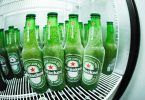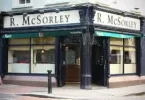‘Perceived indifference’ responsible for 7 in 10 customer desertions
 Marina Blehean: “Focus on selling 20 extra cups of coffee a day. Over six days of the week – even at a margin of just €1 – that equates to an extra €6,000 a year.”
Marina Blehean: “Focus on selling 20 extra cups of coffee a day. Over six days of the week – even at a margin of just €1 – that equates to an extra €6,000 a year.”“Who’s driving your business?” she asked, “Do you drive your business or does your business drive you?”
It’s important to have what she called “money mastery” – knowing where the business stands in terms of input costs and profitable income.
Then there’s “delivery mastery” – the consistent delivery of quality pints and other areas where portion control must be consistent.
There’s also “time mastery” and “destination mastery” – what do you want out of life?
5 reasons why customers stop buying from you:
Moved away – 4%
Changed suppliers or received a more compelling offer – 5%
Made aware of a true competitive advantage – 9%
On price grounds – 14%
Perceived indifference – 68%
“Do all your customers have that feeling of being ‘special’?” she asked.
Increasing profit
Vintners must be aware of the profit margins on all their drinks and products.
“Focus on selling 20 extra cups of coffee a day, for example” she suggested, “Over six days of the week – even at a margin of €1 – that equates to an extra €6,000 a year.”
Other considerations for increasing profit could include refining profit margins, the rate at which you can convert customers to come to your premises, the average sale price (increase this?), maximising the number of the transactions and generating more leads for the pub.
Marina provided a case history of one pub that had used her suggestions and which had raised its turnover from €17,000 to €32,000 a week through improved gross profits and reduced labour costs as a percentage of turnover.
She’d got the owner to introduce clear, defined roles and responsibilities within the premises. She’d improved both the sales and the service standards through training the staff while the pub had increased the average sale value by raising its prices.
Social media had also helped market the pub both generally and locally.
Major events now happened every week that helped lift both the customers and the staff – feedback from both had been excellent.
A consistent marketing strategy was now in place and in addition, a focus on ‘customer experience’ had improved the atmosphere there for both customers and staff.
The pub had benefited from the introduction of regular weekly team meetings that had improved both morale and success.








